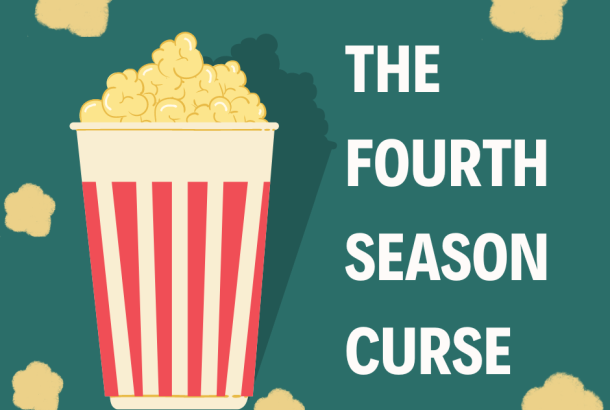“I want the truth, whatever it is”: The representation of student journalism in Riverdale
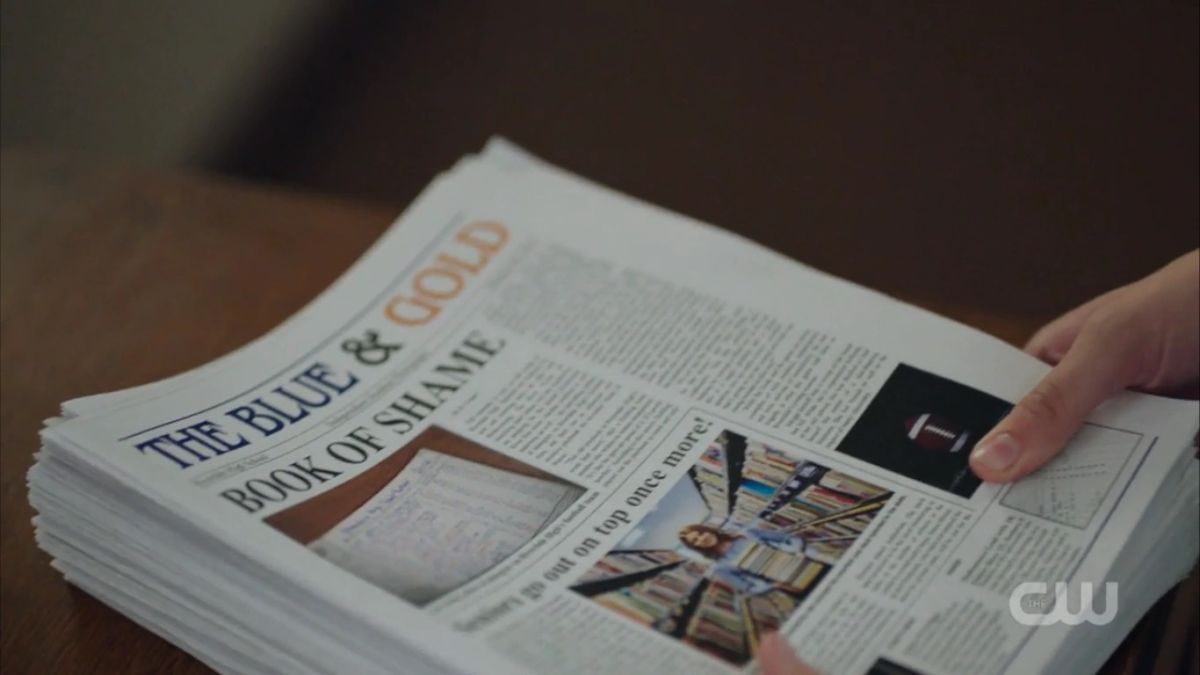
Having reached completion last year, Riverdale distinguishes itself from fellow American teen dramas with its neo-noir colour palette and juxtaposition of retro visuals with modern sensibilities. Betty, Archie, Veronica, and Jughead, of the Archie comics, are its core four characters. All are friends, reflecting a classic archetype; the girl next door, the football player, the socialite, and the recluse. Riverdale’s infamously outlandish and incoherent storylines amplify its entertainment value, despite disappointing those who sought a more natural continuation of Season 1’s compact high school murder mystery.
This article contains spoilers.
Student journalism in television
Even so, Riverdale offers meaningful commentary in an overlooked area: student journalism. Last year’s short-lived TV show Grease: Rise of the Pink Ladies and popular teen dramedy The Sex Lives of College Girls also incorporate student journalism. However, both the former’s student newspaper and the latter’s comedy magazine are inconsequential, revealing very little about student journalism. Alaska Daily offers a thorough insight into investigative reporting at a local Alaskan newspaper but lacks a student focus. The show was promptly cancelled and wiped from streaming services just four months after its release last year. Still a staple on Netflix worldwide, Riverdale offers the most extensive and significant depiction of student journalism in mainstream media, with its student newspaper running in-universe for seven seasons.
Student journalists write and edit news and feature stories with a local focus, on topics of relevance and interest to their student body. Uniquely positioned to hold their institutions to account, student publications feature on-the-ground reporting in areas where national media lacks immediate access. Like The Mancunion, Riverdale’s student newspaper The Blue & Gold operates as an online and print publication.
Open for business as of today. #CWRiverdale #Season1 @ArchieComics @CW_Riverdale @lilireinhart @colesprouse pic.twitter.com/ANPj0iEJDS
— RobertoAguirreSacasa (@WriterRAS) September 21, 2016
Origins of The Blue & Gold
In Season 1, Betty revives the previously dormant Blue & Gold – assuming the editor-in-chief position. Frustrated by her mother Alice’s sensationalised local coverage of her classmate Jason’s murder, she is keen to share the “real story” of what happened. Veronica is keen to aid her investigation, telling Betty “I want the truth, whatever it is.” Aspiring novelist Jughead accepts a writing position at the paper. Betty’s friend Kevin writes a gossip column for The Blue & Gold in Season 2, and expresses an interest in arts reporting in Season 4, diversifying The Blue & Gold’s predominantly news-based coverage. The characters’ collective focus on delivering factual, compassionate reporting establishes The Blue & Gold as a publication with integrity at its core.
Student-focused stories
Riverdale highlights further examples of student journalism being necessary to cover stories that matter to students. When Jughead is mistakenly thought to have died in Season 4, he narrates that The Blue & Gold published an “irreverent” obituary about him, compared to the “perfunctory” one published in The Riverdale Register. The TV show Not Dead Yet features a journalist who writes obituaries for a national newspaper. While doing so, she can see and speak to the ghosts of the deceased. Getting to know them, like The Blue & Gold’s team know Jughead, allows her to produce thoughtful and poignant work. This highlights how a personal connection to a story can increase the story’s impact. Additionally, Archie converts Riverdale’s El Royale Fight Club into a community centre to help shelter homeless children. When Veronica laments that not enough people know about the centre to be able to support it, Betty offers to profile Archie’s work in The Blue & Gold.
Jacob Robinson, Head Investigations Editor for The Mancunion, drew parallels with The Mancunion’s coverage of stories which involve and affect students: “This year, The Mancunion‘s investigations section broke an exclusive story on the planned introduction of spot checks on international students’ attendance… which may not have been written or picked up by a mainstream publication given that we were those who were most aware of the story.”
Jacob adds, “Other stories, such as the rising cost of university sports, the state of student housing, life as a student nurse, and the impact of the UCU marking and assessment boycott on graduating students… discuss crucial issues facing students, a narrative mainstream publications tend to lack despite their importance”.
Moral issues
Sharing information about people close to them creates complex moral predicaments for The Blue & Gold’s team. In Season 2, Jughead plans to write about Veronica’s criminal father Hiram buying Pop’s Chock’lit Shoppe, a 24-hour family-run diner described as “the heart of Riverdale.” Pop asks Jughead to keep the information private – fearing it would upset his mother to know that the diner is no longer in the family. Jughead respects Pop’s wishes. He prioritises his familial bond with Pop, which precedes the show’s pilot, over a short-lived exclusive story.
Betty, however, is more prone to impulsive decision-making. Serial killer The Black Hood tempts her to publish a story about Alice’s arrest as a member of the Southside Serpents, a criminal gang, as a teenager. Despite initially feeling uneasy about doing this, she soon changes her mind, insisting upon the need for “justice”. The evidence she publishes is truthful, but it is shared spitefully – with no prospect of a productive outcome.
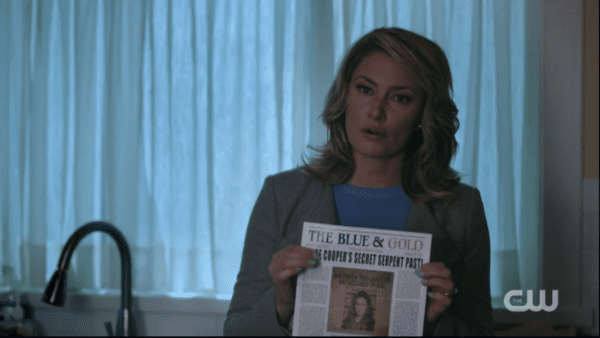
Interviewing students
When operating with greater integrity, Betty expresses the importance of interviewing students to gain unique insights into student-centred stories. In Season 1, Veronica is publicly slut-shamed by Chuck, a football player at Riverdale High. Betty speaks to other female students who have experienced the same treatment from the school’s football players, gathering evidence for an exposé about the football team’s misogyny. Her investigation into Jason’s murder leads her to interview his former team-mate and friend Trevor – who shares his perspective on Jason’s behaviour shortly before his death.
Similarly, Jacob highlighted how The Mancunion frequently brings student perspectives to light through interviews: “Student journalism can often be overlooked, but when you consider the issues young people are facing nowadays, student journalists often have the easiest access to those who are directly impacted.”
Nonetheless, student journalism has limitations. Despite their best efforts, Jughead and Betty are unable to get substantive quotes for particularly contentious articles. These articles concern Hiram’s unethical business activity, and a football player from a rival school, Stonewall Prep, attacking a Riverdale High football player. Jughead and Betty lack the bargaining power or resources to consolidate their claims, which gives Hiram grounds to sue The Blue & Gold, and Principal Honey the right to reject Betty’s story based on it being “hearsay.”
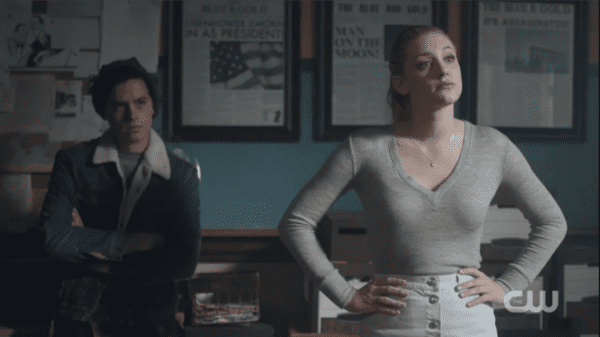
Biased reporting
Ironically, Betty is unwilling to include quotes from sources who don’t share her personal viewpoint on a story. In Season 3, Betty follows Kevin, a recent recruit of the Farm, Riverdale’s cult-like commune, into the woods, where he meets Farm leader Evelyn and the rest of the group. They cheer Kevin on as he performs a firewalk – walking on hot coals barefoot. When Kevin and Evelyn confront Betty about intruding on their gathering, she reads from her Blue & Gold article about witnessing “a dangerous cult of deluded teenagers, who gather for occult-like, self-harming activities.” Betty dismisses Kevin’s description of the experience as “euphoric,” claiming that The Blue & Gold’s readership would disagree.
Any activities involving fire pose risk. However, firewalkers’ feet are not in contact with the hot surface long enough to burn, and embers are poor conductors of heat. The experience can inspire renewed self-belief and courage in participants. We Love MCR Charity hosts an annual firewalk in St Ann’s Square to raise money for Manchester’s communities and young people. Had Betty included Kevin’s perspective, and done some further research, she would have produced a more well-rounded and informative piece.
Problems with objectivity also arise when Jughead’s dad FP is charged with Jason’s murder. Betty publishes a story on FP’s innocence in The Blue & Gold, failing to acknowledge how her position as Jughead’s girlfriend undermines the perceived accuracy of her reporting. She breaks the established trust with her readers – who vandalise her locker in anger.
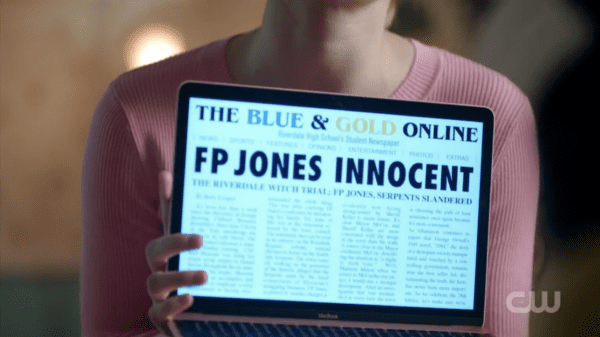
Other ways to make a difference
Real-world action can be more suited to shifting public opinion than student journalism. In Season 2, Jughead speaks to Thomas Topaz, a founding member of the Serpents and descendant of the Uktena tribe. Thomas recounts how a man named General Pickens massacred the Uktena tribe, and stole the land that became Riverdale. Realising that Hiram’s town-wide Pickens Day celebration is honouring a murderer, Jughead believes he must hold Hiram accountable. After his article’s publication, his friend Toni, Thomas’s granddaughter, tells him he was the wrong person to tell the story. He had positioned himself as a white saviour. Together, they mobilise the Serpents for a silent protest at the Pickens Day event, to represent and honour the dead and silenced. Likewise, UoM students have recently been involved in pro-Palestine protests on and off campus.
Unlike prior seasons, Riverdale’s final season is set in the 1950s, with the same characters. Toni writes an article about Emmett Till, an African American boy who was killed in Mississippi at the age of 14 – having been accused of offending a white woman. Principal Featherhead refuses to publish the story. Shortly afterwards, Toni creates a literary society for Riverdale’s Black students, which publishes a journal, Black Athena, that platforms Black voices and writing. This space allows Black students to express themselves on their own terms, and receive peer support. When documenting civil rights stories in The Blue & Gold eventually becomes feasible, they share the emotional labour between them. Black Athena becomes revered in its own right, described as Riverdale High’s “acclaimed literary magazine.”

Legacy and editorial freedom
In Riverdale, student journalism leaves a lasting legacy. The core four’s graduating class opened the time capsule buried by Riverdale High’s first graduating class 75 years ago. It contains a copy of The Blue & Gold from 1945, allowing the students to see how far Riverdale’s student journalism has come. Betty places the latest copy of The Blue & Gold into a new time capsule, continuing the tradition of honouring the school’s journalistic history. Similarly, The Mancunion has existed in various forms for 60 years. Previous issues can be accessed through contacting the university’s Special Collections team. An 86-year-old Betty fondly revisits the Blue & Gold office in Riverdale’s series finale. Looking at the framed articles on the wall, she expresses pride that the newspaper “was in dialogue with whatever greater issues were affecting the country.”
Just as The Mancunion’s editor-in-chief position is open to recent UoM graduates, Jughead also returns to Riverdale High – albeit seven years after graduating – to supervise the newly restarted student paper. Issues surrounding editorial independence surface. In a training session at The Blue & Gold, Jughead describes freedom of the press as fundamental to a healthy, functioning society. He emphatically states that “the truth is shaped to serve those […] in power.” The newly formed Lodge Ledger, owned by Hiram, functions in this way.
Jughead renames Riverdale High’s newspaper The Riverdale Choice, reinforcing its function as a free press – focused on reporting “truthfully and without bias.” The Mancunion is also editorially independent from the Students’ Union and the University of Manchester. Departing from Betty’s imbalanced news coverage during their school days, Jughead insists that “whoever is in charge, we will hold them accountable […] especially if they’re our friends.” His actions highlight the role of student journalism in holding individuals and institutions to account where local news outlets are compromised.
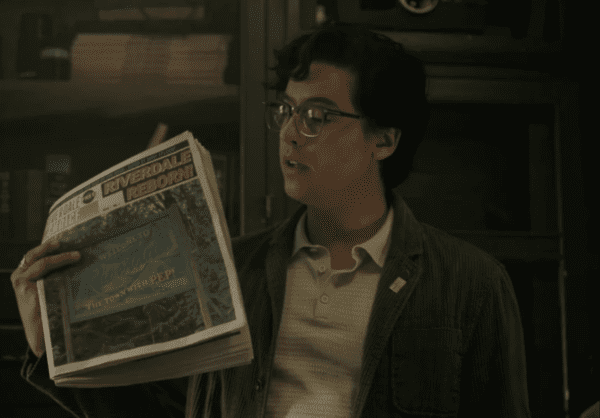
Wider impact
Student journalism can also be a stepping stone to a successful journalistic career in the wider field. Jughead becomes the editor-in-chief of Jughead’s Madhouse Magazine, described as “an institution” which people “still love 70 years later.” Betty works as a freelance writer in New York, penning the advice column ‘Betty’s Diary’ and starting the feminist She Says magazine.
Riverdale’s portrayal of student journalism often takes creative liberties, prioritising high-stakes drama over realism for entertainment purposes. Despite this, it is heartening to see the talent and tenacity of student journalists, at The Mancunion and beyond, reflected in a show as culturally impactful as Riverdale. The precedent established will hopefully pave the way for further depictions of student journalism on the small screen.
Riverdale (2017-2023) is available to watch on Netflix.



